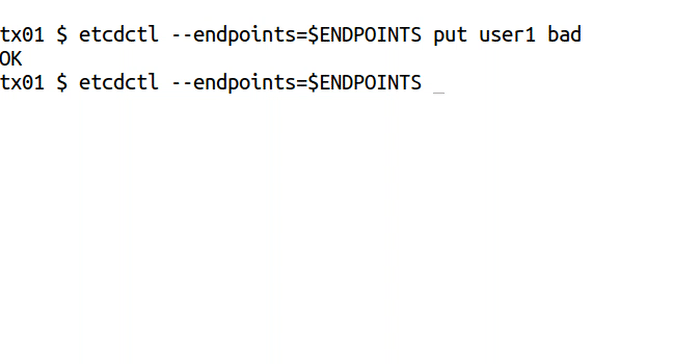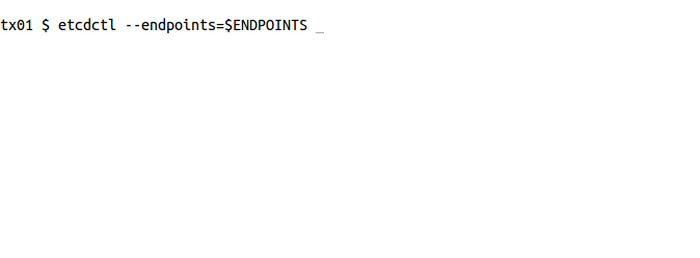使用etcd集群官方示例(演示版)
官方原文地址:https://etcd.io/docs/v3.3.13/demo/
启动集群(Set up a cluster)
在每个etcd节点上,指定集群成员:
TOKEN=token-01
CLUSTER_STATE=new
NAME_1=machine-1
NAME_2=machine-2
NAME_3=machine-3
HOST_1=10.240.0.17
HOST_2=10.240.0.18
HOST_3=10.240.0.19
CLUSTER=${NAME_1}=http://${HOST_1}:2380,${NAME_2}=http://${HOST_2}:2380,${NAME_3}=http://${HOST_3}:2380
在每个etcd节点上进行如下操作:
# For machine 1
THIS_NAME=${NAME_1}
THIS_IP=${HOST_1}
etcd --data-dir=data.etcd --name ${THIS_NAME} \
--initial-advertise-peer-urls http://${THIS_IP}:2380 --listen-peer-urls http://${THIS_IP}:2380 \
--advertise-client-urls http://${THIS_IP}:2379 --listen-client-urls http://${THIS_IP}:2379 \
--initial-cluster ${CLUSTER} \
--initial-cluster-state ${CLUSTER_STATE} --initial-cluster-token ${TOKEN}
# For machine 2
THIS_NAME=${NAME_2}
THIS_IP=${HOST_2}
etcd --data-dir=data.etcd --name ${THIS_NAME} \
--initial-advertise-peer-urls http://${THIS_IP}:2380 --listen-peer-urls http://${THIS_IP}:2380 \
--advertise-client-urls http://${THIS_IP}:2379 --listen-client-urls http://${THIS_IP}:2379 \
--initial-cluster ${CLUSTER} \
--initial-cluster-state ${CLUSTER_STATE} --initial-cluster-token ${TOKEN}
# For machine 3
THIS_NAME=${NAME_3}
THIS_IP=${HOST_3}
etcd --data-dir=data.etcd --name ${THIS_NAME} \
--initial-advertise-peer-urls http://${THIS_IP}:2380 --listen-peer-urls http://${THIS_IP}:2380 \
--advertise-client-urls http://${THIS_IP}:2379 --listen-client-urls http://${THIS_IP}:2379 \
--initial-cluster ${CLUSTER} \
--initial-cluster-state ${CLUSTER_STATE} --initial-cluster-token ${TOKEN}
或使用我们的公共发现服务:
curl https://discovery.etcd.io/new?size=3
https://discovery.etcd.io/a81b5818e67a6ea83e9d4daea5ecbc92
# grab this token
TOKEN=token-01
CLUSTER_STATE=new
NAME_1=machine-1
NAME_2=machine-2
NAME_3=machine-3
HOST_1=10.240.0.17
HOST_2=10.240.0.18
HOST_3=10.240.0.19
DISCOVERY=https://discovery.etcd.io/a81b5818e67a6ea83e9d4daea5ecbc92
THIS_NAME=${NAME_1}
THIS_IP=${HOST_1}
etcd --data-dir=data.etcd --name ${THIS_NAME} \
--initial-advertise-peer-urls http://${THIS_IP}:2380 --listen-peer-urls http://${THIS_IP}:2380 \
--advertise-client-urls http://${THIS_IP}:2379 --listen-client-urls http://${THIS_IP}:2379 \
--discovery ${DISCOVERY} \
--initial-cluster-state ${CLUSTER_STATE} --initial-cluster-token ${TOKEN}
THIS_NAME=${NAME_2}
THIS_IP=${HOST_2}
etcd --data-dir=data.etcd --name ${THIS_NAME} \
--initial-advertise-peer-urls http://${THIS_IP}:2380 --listen-peer-urls http://${THIS_IP}:2380 \
--advertise-client-urls http://${THIS_IP}:2379 --listen-client-urls http://${THIS_IP}:2379 \
--discovery ${DISCOVERY} \
--initial-cluster-state ${CLUSTER_STATE} --initial-cluster-token ${TOKEN}
THIS_NAME=${NAME_3}
THIS_IP=${HOST_3}
etcd --data-dir=data.etcd --name ${THIS_NAME} \
--initial-advertise-peer-urls http://${THIS_IP}:2380 --listen-peer-urls http://${THIS_IP}:2380 \
--advertise-client-urls http://${THIS_IP}:2379 --listen-client-urls http://${THIS_IP}:2379 \
--discovery ${DISCOVERY} \
--initial-cluster-state ${CLUSTER_STATE} --initial-cluster-token ${TOKEN}
现在etcd准备好了!使用etcdctl连接到etcd:
export ETCDCTL_API=3
HOST_1=10.240.0.17
HOST_2=10.240.0.18
HOST_3=10.240.0.19
ENDPOINTS=$HOST_1:2379,$HOST_2:2379,$HOST_3:2379
etcdctl --endpoints=$ENDPOINTS member list
访问etcd(Access etcd)
put 写操作:
etcdctl --endpoints=$ENDPOINTS put foo "Hello World!"
get 读操作:
etcdctl --endpoints=$ENDPOINTS get foo
etcdctl --endpoints=$ENDPOINTS --write-out="json" get foo
前缀查找(Get by prefix)
etcdctl --endpoints=$ENDPOINTS put web1 value1
etcdctl --endpoints=$ENDPOINTS put web2 value2
etcdctl --endpoints=$ENDPOINTS put web3 value3
etcdctl --endpoints=$ENDPOINTS get web --prefix
删除操作(Delete)
etcdctl --endpoints=$ENDPOINTS put key myvalue
etcdctl --endpoints=$ENDPOINTS del key
etcdctl --endpoints=$ENDPOINTS put k1 value1
etcdctl --endpoints=$ENDPOINTS put k2 value2
etcdctl --endpoints=$ENDPOINTS del k --prefix
事务(Transactional write)
etcd中事务是原子执行的,只支持if … then … else …这种表达,类似三元表达式:
etcdctl --endpoints=$ENDPOINTS put user1 bad
etcdctl --endpoints=$ENDPOINTS txn --interactive
compares:
value("user1") = "bad"
success requests (get, put, delete):
del user1
failure requests (get, put, delete):
put user1 good
监听(Watch)
watch to get notified of future changes:
etcdctl --endpoints=$ENDPOINTS watch stock1
etcdctl --endpoints=$ENDPOINTS put stock1 1000
etcdctl --endpoints=$ENDPOINTS watch stock --prefix
etcdctl --endpoints=$ENDPOINTS put stock1 10
etcdctl --endpoints=$ENDPOINTS put stock2 20
租约(Lease)
lease to write with TTL:
etcdctl --endpoints=$ENDPOINTS lease grant 300
# lease 2be7547fbc6a5afa granted with TTL(300s)
etcdctl --endpoints=$ENDPOINTS put sample value --lease=2be7547fbc6a5afa
etcdctl --endpoints=$ENDPOINTS get sample
etcdctl --endpoints=$ENDPOINTS lease keep-alive 2be7547fbc6a5afa
etcdctl --endpoints=$ENDPOINTS lease revoke 2be7547fbc6a5afa
# or after 300 seconds
etcdctl --endpoints=$ENDPOINTS get sample
分布式锁(Distributed locks)
lock for distributed lock:
etcdctl --endpoints=$ENDPOINTS lock mutex1
# another client with the same name blocks
etcdctl --endpoints=$ENDPOINTS lock mutex1
选举(Elections)
elect for leader election:
etcdctl --endpoints=$ENDPOINTS elect one p1
# another client with the same name blocks
etcdctl --endpoints=$ENDPOINTS elect one p2
集群状态监控(Cluster status)
健康状态检查
etcdctl --write-out=table --endpoints=$ENDPOINTS endpoint status
+------------------+------------------+---------+---------+-----------+-----------+------------+
| ENDPOINT | ID | VERSION | DB SIZE | IS LEADER | RAFT TERM | RAFT INDEX |
+------------------+------------------+---------+---------+-----------+-----------+------------+
| 10.240.0.17:2379 | 4917a7ab173fabe7 | 3.0.0 | 45 kB | true | 4 | 16726 |
| 10.240.0.18:2379 | 59796ba9cd1bcd72 | 3.0.0 | 45 kB | false | 4 | 16726 |
| 10.240.0.19:2379 | 94df724b66343e6c | 3.0.0 | 45 kB | false | 4 | 16726 |
+------------------+------------------+---------+---------+-----------+-----------+------------+
etcdctl --endpoints=$ENDPOINTS endpoint health
10.240.0.17:2379 is healthy: successfully committed proposal: took = 3.345431ms
10.240.0.19:2379 is healthy: successfully committed proposal: took = 3.767967ms
10.240.0.18:2379 is healthy: successfully committed proposal: took = 4.025451ms
快照(Snapshot)
snapshot 用于保存etcd数据库的快照:
etcdctl --endpoints=$ENDPOINTS snapshot save my.db
Snapshot saved at my.db
etcdctl --write-out=table --endpoints=$ENDPOINTS snapshot status my.db
+---------+----------+------------+------------+
| HASH | REVISION | TOTAL KEYS | TOTAL SIZE |
+---------+----------+------------+------------+
| c55e8b8 | 9 | 13 | 25 kB |
+---------+----------+------------+------------+
(迁移)Migrate
migrate 用于将v2迁移到v3:
# write key in etcd version 2 store
export ETCDCTL_API=2
etcdctl --endpoints=http://$ENDPOINT set foo bar
# read key in etcd v2
etcdctl --endpoints=$ENDPOINTS --output="json" get foo
# stop etcd node to migrate, one by one
# migrate v2 data
export ETCDCTL_API=3
etcdctl --endpoints=$ENDPOINT migrate --data-dir="default.etcd" --wal-dir="default.etcd/member/wal"
# restart etcd node after migrate, one by one
# confirm that the key got migrated
etcdctl --endpoints=$ENDPOINTS get /foo
集群成员管理(Member)
member 用于添加,删除,更新成员:
# For each machine
TOKEN=my-etcd-token-1
CLUSTER_STATE=new
NAME_1=etcd-node-1
NAME_2=etcd-node-2
NAME_3=etcd-node-3
HOST_1=10.240.0.13
HOST_2=10.240.0.14
HOST_3=10.240.0.15
CLUSTER=${NAME_1}=http://${HOST_1}:2380,${NAME_2}=http://${HOST_2}:2380,${NAME_3}=http://${HOST_3}:2380
# For node 1
THIS_NAME=${NAME_1}
THIS_IP=${HOST_1}
etcd --data-dir=data.etcd --name ${THIS_NAME} \
--initial-advertise-peer-urls http://${THIS_IP}:2380 \
--listen-peer-urls http://${THIS_IP}:2380 \
--advertise-client-urls http://${THIS_IP}:2379 \
--listen-client-urls http://${THIS_IP}:2379 \
--initial-cluster ${CLUSTER} \
--initial-cluster-state ${CLUSTER_STATE} \
--initial-cluster-token ${TOKEN}
# For node 2
THIS_NAME=${NAME_2}
THIS_IP=${HOST_2}
etcd --data-dir=data.etcd --name ${THIS_NAME} \
--initial-advertise-peer-urls http://${THIS_IP}:2380 \
--listen-peer-urls http://${THIS_IP}:2380 \
--advertise-client-urls http://${THIS_IP}:2379 \
--listen-client-urls http://${THIS_IP}:2379 \
--initial-cluster ${CLUSTER} \
--initial-cluster-state ${CLUSTER_STATE} \
--initial-cluster-token ${TOKEN}
# For node 3
THIS_NAME=${NAME_3}
THIS_IP=${HOST_3}
etcd --data-dir=data.etcd --name ${THIS_NAME} \
--initial-advertise-peer-urls http://${THIS_IP}:2380 \
--listen-peer-urls http://${THIS_IP}:2380 \
--advertise-client-urls http://${THIS_IP}:2379 \
--listen-client-urls http://${THIS_IP}:2379 \
--initial-cluster ${CLUSTER} \
--initial-cluster-state ${CLUSTER_STATE} \
--initial-cluster-token ${TOKEN}
然后使用命令 member remove 和 member add替换成员:
# get member ID
export ETCDCTL_API=3
HOST_1=10.240.0.13
HOST_2=10.240.0.14
HOST_3=10.240.0.15
etcdctl --endpoints=${HOST_1}:2379,${HOST_2}:2379,${HOST_3}:2379 member list
# remove the member
MEMBER_ID=278c654c9a6dfd3b
etcdctl --endpoints=${HOST_1}:2379,${HOST_2}:2379,${HOST_3}:2379 \
member remove ${MEMBER_ID}
# add a new member (node 4)
export ETCDCTL_API=3
NAME_1=etcd-node-1
NAME_2=etcd-node-2
NAME_4=etcd-node-4
HOST_1=10.240.0.13
HOST_2=10.240.0.14
HOST_4=10.240.0.16 # new member
etcdctl --endpoints=${HOST_1}:2379,${HOST_2}:2379 \
member add ${NAME_4} \
--peer-urls=http://${HOST_4}:2380
接下来启动新成员,使用--initial-cluster-state标志:
# [WARNING] If the new member starts from the same disk space,
# make sure to remove the data directory of the old member
# [警告] 如果新成员和旧成员使用同一个磁盘空间,需要先清除旧成员的历史数据
#
# restart with 'existing' flag
TOKEN=my-etcd-token-1
CLUSTER_STATE=existing
NAME_1=etcd-node-1
NAME_2=etcd-node-2
NAME_4=etcd-node-4
HOST_1=10.240.0.13
HOST_2=10.240.0.14
HOST_4=10.240.0.16 # new member
CLUSTER=${NAME_1}=http://${HOST_1}:2380,${NAME_2}=http://${HOST_2}:2380,${NAME_4}=http://${HOST_4}:2380
THIS_NAME=${NAME_4}
THIS_IP=${HOST_4}
etcd --data-dir=data.etcd --name ${THIS_NAME} \
--initial-advertise-peer-urls http://${THIS_IP}:2380 \
--listen-peer-urls http://${THIS_IP}:2380 \
--advertise-client-urls http://${THIS_IP}:2379 \
--listen-client-urls http://${THIS_IP}:2379 \
--initial-cluster ${CLUSTER} \
--initial-cluster-state ${CLUSTER_STATE} \
--initial-cluster-token ${TOKEN}
权限(Auth)
auth,user,role for authentication:
export ETCDCTL_API=3
ENDPOINTS=localhost:2379
etcdctl --endpoints=${ENDPOINTS} role add root
etcdctl --endpoints=${ENDPOINTS} role grant-permission root readwrite foo
etcdctl --endpoints=${ENDPOINTS} role get root
etcdctl --endpoints=${ENDPOINTS} user add root
etcdctl --endpoints=${ENDPOINTS} user grant-role root root
etcdctl --endpoints=${ENDPOINTS} user get root
etcdctl --endpoints=${ENDPOINTS} auth enable
# now all client requests go through auth
etcdctl --endpoints=${ENDPOINTS} --user=root:123 put foo bar
etcdctl --endpoints=${ENDPOINTS} get foo
etcdctl --endpoints=${ENDPOINTS} --user=root:123 get foo
etcdctl --endpoints=${ENDPOINTS} --user=root:123 get foo1


